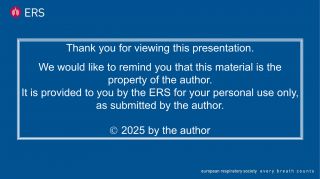18 March, 2025 | Online
17:00-18:00 CET
Chairs: Prof. Dr Alexander Möller (Zürich, Switzerland), Dr Susanne Vijverberg (Amsterdam, Netherlands)
Speakers: Dr Tom Ruffles (Hove, United Kingdom), Dr Elise Slob (Amsterdam, Netherlands)
Fees: Free for ERS members / €10 for non-members
Find out more about becoming a member
Translation available
Participants in this webinar can benefit from translation during the live event. The translation function can be found underneath the live event's video player; up to 60 languages are available, with both subtitled and audio translation available. Please note that this is currently available for the live event only.
Learn more about this function.
Overview
Asthma is one of the most common chronic conditions in children, with significant variability in treatment response. Emerging research suggests that genetic variations influence how paediatric patients respond to asthma medications. This webinar will explore the current state of genotype-guided treatment for paediatric asthma, examining its potential to improve personalised therapy and patient outcomes.
Educational aims
- To provide an overview of the role of pharmacogenetics in paediatric asthma treatment.
- To discuss current evidence on ADRB2 genotype-guided approaches for asthma management.
- To highlight challenges and future directions in implementing personalised asthma therapy.
- To equip healthcare professionals with knowledge on how genetic insights could shape future treatment strategies.
Topics:
- Pharmacogenetics in asthma: how genetic variations influence drug response, such as response to LABA.
- Current evidence on ADRB2 Genotype-guided treatment: recent studies and clinical trials, such as PACT and PUFFIN.
- Practical considerations: implementation challenges, cost-effectiveness, and ethical concerns.
- Future directions: emerging research and the potential for routine clinical application.
Format
One-hour webinar format: 45 minutes for presentations, followed by a 15-minute Q&A session.
Learning outcomes
Following this webinar, participants will be able to:
- Understand the impact of genetic variations on asthma treatment in children.
- Gain insight into the latest research on ADRB2 genotype-guided therapy.
- Be aware of the practical challenges in implementing personalised treatment.
- Recognise potential future applications of pharmacogenetics in paediatric asthma care.
CME credit
An application for accreditation of this webinar has been made to the European Board for Accreditation in Pneumology (EBAP) for 1 CME credit per 1-hour attendance. If accredited, the CME credit will be granted upon attendance of at least 60 minutes during the live webinar only.
What is a webinar?
A webinar closely simulates a lecture-based teaching experience. The speaker can interact with the audience, just as in a classroom setting. During the webinar, you will be asked to share your opinion on issues related to the topic using interactive polls.
All participants will be able to hear the lecturer and see the slides throughout the presentation. As a participant you will be able to pose questions or discuss ideas with the other participants via the text chat facility and the speaker will respond to the questions via the microphone.
Login guidelines
More information will be communicated in due course.
- Please log in to the webinar 20 minutes before it is scheduled to commence. If you have any technical difficulties whilst trying to log in or during the session please contact e-learning@ersnet.org.
- Check Central European Time.
- To achieve the best quality, we recommend to avoid downloading anything from the internet during your connection to the lecture and stopping all other programmes.
- Please also ensure that your audio settings are not set to mute and adjust the volume to a comfortable level.
Diseases/methods:
- Paediatric respiratory diseases
- Pharmacogenetics and personalised medicine in respiratory diseases
- Allergic airway diseases
Target audience
- Paediatricians
- Respiratory specialists
- Clinical geneticists
- Pharmacists
- General practitioners
- Researchers in personalised medicine
- Healthcare policymakers

